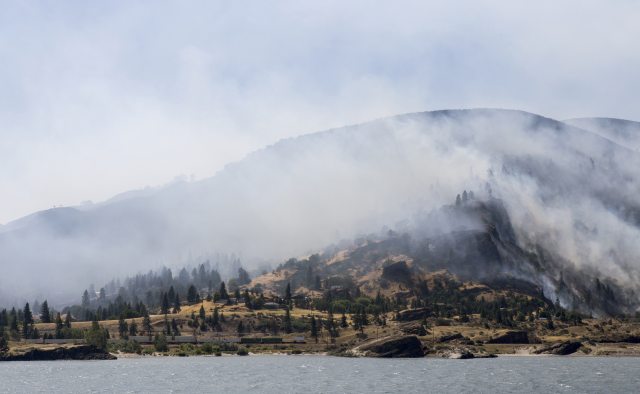Wildfire season is here; how to cope with smoky air
| Healthy You | Safety | Resources

Simple steps can help you and your loved ones breathe easier.
Wildfires are a fact of life in a lot of places, including the Pacific Northwest. Hot, dry conditions make it easy for these fires to start — and hard to put them out.
How might this affect you? In our region, wildfire season runs from early July through the start of the rainy season in September or October. But in recent years fires have been starting sooner, lasting longer and affecting more people. And experts predict they will happen more often and with greater intensity in the future.
Smoky air is one of the many ways wildfires cause trouble. Even a distant fire can blow heavy smoke in your direction.
Smoky air can be hard on everyone, especially children, older adults, pregnant people and people with heart and lung conditions.
Here’s how to protect yourself and your family.
Preparing for smoky air
You may want to stock up on these supplies ahead of wildfire season:
- Extra air filters: If you have air conditioning, have extra filters on hand. They get dirty faster when the air is smoky.
- Air purifiers: These portable devices can keep your indoor air clean. If you don’t want to buy one, the Environmental Protection Agency has a tutorial on how to make your own using supplies from the hardware store.
- Face masks: N95 masks can filter smoke particles out of the air you breathe. These are useful if you have to go outside. Other kinds of face masks aren’t as effective, but can be helpful, too.
- Entertainment: Plan ahead to keep kids busy if they’re stuck inside. Art supplies, games, books and movies are great options.
- Other essentials: Check your supply of medication and other necessities in case smoky conditions keep you from going out.
During a wildfire event
Your local Air Quality Index can shoot into the red zone during a smoke event. Reducing your exposure to smoky air is the main way to avoid possible health risks.
Here’s how to protect yourself, your loved ones and your animals. Consider talking to your employer about taking precautions at work, too.
- Stay inside, if possible. Close doors and windows. Cover any cracks with damp cloths to help keep smoke out. You might set up one area in your home as a “clean room.”
- Keep your air clean. This is a good time to avoid dusting, vacuuming, frying and grilling. Run your AC and air purifier to clean your indoor air.
- Skip your workout. When you exercise, you breathe in a lot more air than when you’re resting. It’s healthier to keep your activity level low during smoke events.
- Mask up. If you have to go out, wear an N95 mask.
- Drive safely. Keep your car windows closed and the AC on. Use the recirculate function to avoid pulling smoky air into the vehicle. Turn on your headlights if visibility is low.
- Soothe symptoms. Drink water to help your body deal with any irritants you breathe in. Artificial tears or saline can moisten dry eyes, too, if needed.
- Help pets. The EPA recommends limiting animals’ exposure to smoke in the same way you’d limit your own. Here’s how to care for pets and livestock during a smoke event.
- Stay informed and connected. Monitor local news and local government updates to stay up to date, and check in on your neighbors to make sure they’re OK.
If you can’t keep your indoor air smoke-free at home, or if it gets too hot, consider spending time in public places like libraries and shopping malls that have good indoor air quality. In extreme cases, you may choose to go to a local shelter.
When to get help
Smoky air can irritate your eyes and throat. It can also cause headaches. Treat these symptoms at home. They’ll usually go away once the air clears up. But if you have difficulty breathing, heart palpitations or other serious symptoms, call your healthcare provider right away.
If you or a loved one has a condition like asthma, diabetes, heart disease or COPD, talk to your healthcare provider.
When to get out
What if the fire comes close to your home? Where there’s smoke, sometimes there’s fire. Knowing what’s happening around you will help you stay safe. News outlets and local updates from officials will let you know if it is time to evacuate.
The U.S. Centers for Disease Control and Prevention has a list of steps you can take to prepare your home and family for an evacuation.
After it’s over
You may have some cleanup to do after a smoke event. Even if the air quality is better, conditions can still be hazardous. Here’s how to protect yourself from ash so you don’t inhale irritants from wildfire dust, dirt and soot.





